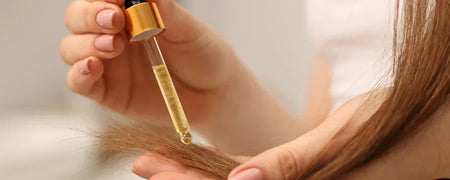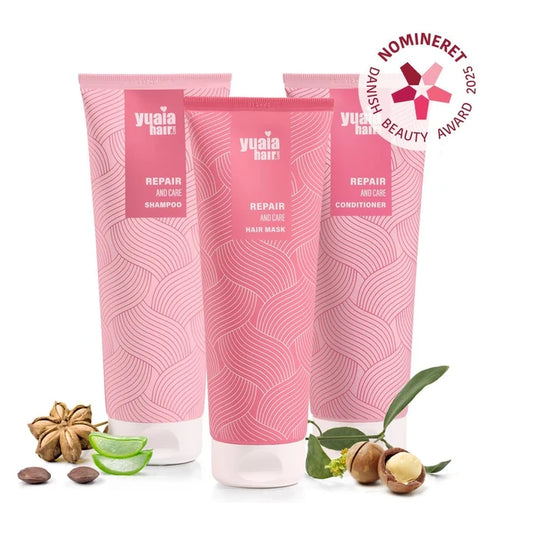
How do I hydrate my hair?
Hydrating dry hair requires a thoughtful combination of using the right products and establishing a consistent routine. One of the most effective solutions is incorporating hair oil into your regimen. Hair oils, such as argan or coconut oil, are excellent for restoring moisture to dry hair. Apply these oils to the lengths and ends of your hair regularly to lock in hydration, reduce frizz, and enhance shine. Hair oil can serve as both a deep treatment and a lightweight daily moisturizer, making it versatile for addressing dryness.
Beyond hair oils, choose a sulfate-free moisturizing shampoo and a hydrating conditioner. These products help cleanse without stripping natural oils and replenish moisture during washing. Deep conditioning treatments, like hair masks, can provide an extra boost of hydration when used weekly or biweekly. These treatments are particularly helpful for maintaining the softness and elasticity of your hair.
For additional care, minimize the use of heat styling tools, which can dry out the hair further. Instead, let your hair air-dry whenever possible and use a microfiber towel to avoid excessive friction.
By combining hair oils, nourishing shampoos, and treatments designed for hydration, you can effectively revive your dry hair and maintain its health and vibrancy.
What are the benefits of using hair oil for dry hair?
Moisture retention and hydration
Hair oils are a highly effective solution for dry hair because they create a protective barrier around the hair shaft, helping to lock in moisture. This barrier prevents dehydration and keeps hair hydrated for longer periods. Oils like argan and coconut are particularly good at penetrating the hair shaft and providing deep hydration, leaving your hair soft and manageable.
Nutrient enrichment for stronger, healthier hair
Rich in vitamins, antioxidants, and fatty acids, hair oils nourish the hair shaft and provide essential nutrients for healthier growth. These nutrients help strengthen weak or brittle strands, making hair more resilient to breakage. Oils like avocado or jojoba deliver the nutrients your hair needs to thrive, enhancing its overall health.
Frizz control and added shine
Dry hair is often prone to frizz, but hair oils work to smooth the cuticle, reducing roughness and flyaways. This results in hair that feels smoother and looks shinier. Lightweight oils, such as argan oil, can enhance shine without weighing down the hair, giving it a polished, sleek appearance.
Protection against heat and environmental damage
Hair oils also act as a natural shield against external stressors like UV rays, pollution, and heat styling tools. Applying oil before styling or exposure to harsh conditions minimizes damage, keeping your hair healthier in the long run. Using oils consistently can create a protective layer that strengthens your hair and prevents future dryness.
What are the best hair oils for dry hair?
Argan oil
Known as "liquid gold," argan oil is a highly sought-after remedy for dry hair, offering deep hydration and nourishment. Extracted from the kernels of the argan tree native to Morocco, this lightweight oil is packed with essential nutrients, including vitamin E, antioxidants, and fatty acids. These components make argan oil particularly effective in restoring moisture to dry hair without weighing it down, making it suitable for all hair types, including fine hair.
Argan oil not only hydrates but also helps tame frizz and smooth the hair cuticle, leaving your hair softer, shinier, and more manageable. Its lightweight texture makes it an excellent choice for everyday use, whether applied as a pre-shampoo treatment, a leave-in product, or a finishing touch for added shine.
With regular use, argan oil strengthens the hair shaft, reduces breakage, and enhances overall hair health, making it a must-have for combating dryness and achieving polished, hydrated locks.
Jojoba oil
Jojoba oil stands out as a versatile and effective solution for dry hair, thanks to its close resemblance to the natural sebum produced by the scalp. This unique property makes it ideal for maintaining hydration and restoring balance to your hair without overwhelming it. Jojoba oil is lightweight and easily absorbed, ensuring it delivers moisture directly to the hair shaft without leaving behind a greasy residue.
This oil works wonders for dry hair by locking in moisture while enhancing softness and shine. Its gentle nature makes it suitable for daily use, whether as a leave-in treatment for the lengths and ends or as part of a regular moisturizing routine. Jojoba oil is especially beneficial for fine hair, as it provides hydration without weighing it down.
With consistent use, jojoba oil can help strengthen hair, minimize breakage, and improve manageability, making it a valuable addition to any hair care regimen.
Coconut oil
Coconut oil is renowned for its remarkable ability to restore moisture and strength to dry hair. Unlike many other oils, coconut oil penetrates deeply into the hair shaft, allowing it to deliver hydration where it’s needed most. This deep conditioning action helps to reduce protein loss, a common issue in dry and damaged hair, thereby strengthening each strand from within.
Its lightweight yet intensely moisturizing nature makes coconut oil ideal for repairing brittle and damaged hair. Whether used as a pre-shampoo treatment or a leave-in conditioner, it smooths the hair cuticle, reduces frizz, and enhances shine, leaving hair softer and more manageable.
Coconut oil’s versatility extends to its use in various hair care routines, whether applied overnight for intensive repair or as a quick hydration boost. With regular use, it helps prevent split ends, improve elasticity, and maintain long-lasting moisture, making it a must-have for revitalizing dry hair.
Rosemary oil
Rosemary oil is a powerful and versatile option for addressing dry hair, offering both hydration and long-term benefits. Known for its ability to improve blood circulation to the scalp, rosemary oil helps deliver nutrients more effectively to the hair follicles, promoting healthier and stronger strands. Its natural properties make it a go-to choice for those seeking to restore moisture while also encouraging hair growth.
This essential oil provides deep nourishment, making it especially effective when combined with carrier oils like coconut or argan. It hydrates dry hair, enhances its texture, and adds a subtle, natural shine. Rosemary oil’s lightweight consistency ensures that it penetrates the hair shaft without weighing it down, making it suitable for various hair types.
When used regularly, rosemary oil not only hydrates and revitalizes dry hair but also strengthens it over time, reducing breakage and promoting overall hair health.
How do I choose the best hair oil for dry hair?
Selecting the right hair oil for dry hair depends on understanding your unique hair needs. Factors like hair porosity, texture, and specific concerns such as breakage or frizz play a crucial role. By choosing oils tailored to your hair type and condition, you can effectively restore moisture, improve strength, and enhance overall hair health.
Hair porosity
Understanding your hair's porosity is essential for choosing the right oil. High-porosity hair, which absorbs moisture quickly but loses it just as fast, requires heavier oils like coconut or castor oil. These deeply penetrating oils provide lasting hydration and help seal the hair shaft. In contrast, low-porosity hair has tightly packed cuticles that resist moisture absorption. Lightweight oils like argan or jojoba are ideal for these strands, as they sit on the surface to lock in moisture without weighing the hair down. Matching the oil to your hair’s porosity ensures optimal hydration and healthier, more manageable hair.
Hair texture
Your hair texture significantly influences the choice of oil for optimal hydration. Fine hair benefits from lightweight oils like grapeseed or argan oil, which moisturize without leaving a heavy or greasy residue. These oils enhance shine and softness while maintaining volume. Coarse or curly hair, on the other hand, thrives with richer oils like avocado or baobab. These heavier oils deeply hydrate, smooth frizz, and improve curl definition by sealing in moisture. Understanding your hair texture ensures you select an oil that provides the right balance of hydration and nourishment, leaving your hair healthy and manageable.
Individual needs
Selecting a hair oil tailored to your specific concerns is essential for achieving the best results. If you’re struggling with breakage, oils like coconut or avocado are excellent choices, as they strengthen the hair shaft and reduce protein loss. For managing frizz, argan or jojoba oil can smooth the hair cuticle and enhance shine without weighing it down. If split ends or dryness are your primary issues, heavier oils like castor or olive oil can provide deep nourishment. By addressing your unique needs, you ensure your hair gets the targeted care it requires for a healthier, more vibrant look.
How do I apply hair oil for dry hair?
Pre-shampoo treatment
A pre-shampoo treatment with hair oil is an effective method to protect and hydrate dry hair. Generously apply the oil to dry hair, focusing on the lengths and ends where dryness is most prevalent. Leave it on for at least 30 minutes to allow the oil to deeply penetrate and nourish the hair. After washing, hair feels softer, smoother, and more manageable. Regular pre-shampoo treatments are a simple yet powerful way to enhance your hair’s hydration and overall health.
Post-wash application
Applying hair oil after washing on towel-dried hair is an effective way to lock in moisture and enhance the appearance of dry hair. Focus on the lengths and ends, where hydration is most needed, to reduce frizz and add a natural shine. Lightweight oils like argan or jojoba are ideal, as they moisturize without weighing the hair down or leaving a greasy residue. Use only a small amount—just a few drops—ensuring even distribution for a polished and manageable look. This simple step helps maintain hydration and leaves your hair feeling smooth, soft, and radiant.
Daily application to lengths and ends
Incorporating hair oil into your daily routine is a simple way to maintain hydration and protect dry hair. Focus on the lengths and ends, as these areas are most prone to dryness and split ends. Apply just a few drops of a lightweight oil, such as argan or jojoba, to avoid greasiness while keeping your hair soft and nourished. This daily practice helps enhance shine, minimize frizz, and reduce damage over time. By consistently hydrating your hair with oil, you can maintain a healthier, more vibrant appearance and prevent the progression of dryness.
Make your own hair oils for dry hair at home
Creating your own hair oils at home is an easy and cost-effective way to address dry hair while tailoring the treatment to your specific needs. By mixing carrier and essential oils, you can craft blends that hydrate, strengthen, and nourish your hair.
- Choose carrier oils
Start with a nourishing base oil that hydrates and protects the hair. Popular carrier oils include coconut oil, known for its deep moisture and protein-repairing properties, argan oil, which enhances shine and smoothness, and jojoba oil, a lightweight option that mimics the scalp’s natural oils. Each carrier oil serves as the foundation of your blend.
- Add essential oils
Essential oils enhance the therapeutic benefits of your blend. Lavender oil helps soothe and moisturize, while rosemary oil stimulates growth and improves circulation. For a simple recipe, combine 2-3 drops of ylang-ylang essential oil with 2 tablespoons of coconut oil to create a deeply hydrating hair treatment. Experiment with different combinations to suit your needs.
- Mix and store
Combine the chosen oils in a clean, dark glass bottle to protect the mixture from light and preserve its potency. Shake well to ensure even blending before each use. Always perform a patch test to rule out sensitivities and adjust the blend as needed to suit your hair type and preferences.
Recipes for hair oils for dry hair
Creating your own hair oil blends allows you to customize treatments for specific needs. Here are a few simple and effective recipes tailored to address dryness:
1. Deep hydration blend
- 2 tablespoons of coconut oil (for moisture and protein repair)
- 1 tablespoon of argan oil (to enhance shine and smoothness)
- 3 drops of lavender essential oil (for soothing and hydration)
Mix the ingredients in a small bowl. Apply to the lengths and ends of your hair, leave for 30 minutes, then rinse thoroughly.
2. Growth and hydration booster
- 2 tablespoons of jojoba oil (for lightweight hydration)
- 1 tablespoon of castor oil (to promote growth)
- 3 drops of rosemary essential oil (to improve circulation and stimulate growth)
Massage into your hair and let it sit for an hour before shampooing.
3. Anti-frizz and shine treatment
- 2 tablespoons of avocado oil (for vitamins A and E)
- 1 tablespoon of grapeseed oil (to control frizz)
- 2 drops of ylang-ylang essential oil (to add shine and nourishment)
Apply sparingly to damp hair after washing for smooth, frizz-free strands.
4. Overnight repair oil
- 2 tablespoons of almond oil (for softness and hydration)
- 1 tablespoon of baobab oil (for deep conditioning)
- 3 drops of chamomile essential oil (to calm and nourish)
Apply before bed and wash out in the morning for silky, hydrated hair.
Safety tips
Always perform a patch test before applying hair oils to check for allergic reactions or sensitivities. Additionally, dilute essential oils properly by mixing a few drops into a tablespoon of carrier oil to prevent irritation. Following these precautions ensures your DIY hair oils are safe and effective for use.
Revitalize your hair with nourishing oils
Incorporating hair oils into your routine is a game-changer for restoring the health and vitality of dry hair. These oils address common causes of dryness by locking in moisture, nourishing the hair shaft, and protecting against damage. Whether you opt for commercial products or create personalized blends at home, hair oils offer a natural and effective solution for hydrating and strengthening your hair.
Consistency and patience are essential for achieving noticeable results. While immediate benefits like added shine and reduced frizz are visible after the first use, long-term improvements require dedication. Regular use of hair oils helps your hair become more resilient, vibrant, and nourished over time.
By selecting the right oils for your hair type and applying them correctly, you can transform dry, brittle strands into soft, healthy locks. Embrace this simple yet powerful approach to hair care and enjoy the results of a well-nurtured mane.
 2-5 day delivery
2-5 day delivery
 25.000+ satisfied customers
25.000+ satisfied customers
 Satisfaction Guarantee
Satisfaction Guarantee



























